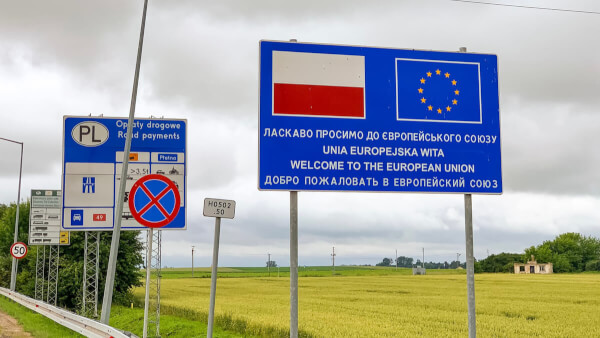Getting a mortgage in Poland as a foreigner: UK guide
Read our comprehensive guide to getting a mortgage in Poland from the UK, covering everything you need to know.

Disclaimer: The contents of this article is for informational purposes only and does not constitute legal or tax advice. You are solely responsible for any tax or other legal liabilities arising from the purchase/sale of foreign property. Decisions to purchase foreign property and their procedure should be made after thorough research, consultation and verification from a qualified financial and legal advisor.
Poland is a popular choice for UK expats and retirees, with around 49,000 Brits now living there.¹ If you own a home in Poland, and you’re thinking of moving house or heading back to the UK, read on.
In this guide, we’ll cover everything you need to know about selling property in Poland. This includes a step-by-step walkthrough of the selling process, the legal requirements, plus an overview of fees, taxes and other costs.
We’ll also show you a low-cost, transparent way to transfer the proceeds of your property sale back to the UK - using the Wise account from the money services provider Wise.
It lets you spend, hold and convert money in 40+ currencies and make secure transfers to 140+ countries for low fees* and great mid-market exchange rates. Every transfer is trackable and you’ll get dedicated support when making large amount transfers.
Get expert support for your large transfer 📞
It’s good news if you’re thinking of selling property in Poland. The country’s housing market is flourishing, with house prices increasing 14.4% annually as of June 2025.²
The increase in prices is a little steadier when compared with the surges seen in 2023 and early 2024, but housing shortages and foreign investment continues to fuel demand.² So, this could be a good time to sell.
And if you’re selling an apartment in a major Polish city, you’re in luck. These have seen especially strong price increases and the average price per square metre of an apartment in Warsaw now commands a higher price than in Brussels³ or Bologna.⁴
Ultimately though, the decision to sell should be made only after researching the local market, looking at house price growth in your location and demand for your type of property.
Here is a step-by-step guide:
While it’s not mandatory to use an estate agent to sell a property in Poland, it could be a smart decision.
A good agent knows the local market inside out, and can sell your property faster and at the best price. They can also handle tasks like buyer viewings, which may be impossible for you to do if you’re outside of the country.
Lastly, an agent can help you navigate the administrative paperwork involved with selling a home in Poland. However, you will also want to appoint your own conveyancing solicitor to handle the legal work.
When it comes to choosing an estate agent, be cautious and do your research. To avoid scams, make sure the agent is licensed and has the right insurance.
Use a personal recommendation if possible, but otherwise you can find an agent through the Polish Real Estate Federation - the main association for real estate agents in Poland.⁵
Now it’s time to put your property on the market and start advertising to attract a buyer. If you’re using an estate agent, they should do much of this work for you.
But otherwise, make sure you list your property on the most popular real estate websites and portals in Poland:
Once you have a buyer and have negotiated and accepted an offer, the next step is to draw up and sign an initial contract. This doesn’t have to, but often involves the services of a notary, usually paid for by the buyer.
Bear in mind that many notaries will only speak Polish, so you may need to ask the buyer to appoint an English-speaking notary or bring in your own translator.
Using a notary makes this contract legally binding in the form of a notarial deed offering both parties protection, and it includes all the details, terms and any conditions of the sale.
With the initial contract signed, the buyer will pay you the deposit to reserve the property.
Deposits for residential property purchases in Poland are usually about 10% of the purchase price.⁶ At this point, both parties will agree on a date for completion. The notary will start the necessary work of carrying out the required checks and searches.
You’re nearly there. The final step is to attend a meeting with the buyer, notary and respective conveyancing solicitors to sign the final contract of sale. This contract transfers the title of the property from your name to the buyers. The balance of the purchase price is paid by the buyer at this stage.
You’ll hand over the keys to the buyer, and the notary will carry out the final step of registering the sale with the land and mortgage register.
The time it takes to sell a home in Poland varies depending on where your property is located and demand for your type of property in the market.
If there’s a lot of negotiation on the price between buyer and seller, or legal issues that need to be ironed out, it can take longer.
Another thing that can affect how long it takes is who you sell to.
Non-EU residents need to apply to the Polish Ministry of the Interior for a permit to buy real estate. This can take around 2-4 months and sometimes longer depending on the complexity of the application, so it could potentially hold up the sale.⁷
The best way to improve your chances of a quick sale is to get your documentation in order, and appoint a conveyancing solicitor as soon as possible.
The following tips can also help you to sell your Polish property faster:
Now we come to the most important part - how much it’ll cost you to sell a property in Poland.
Let’s run through the main fees and taxes you need to factor into your overall budget.
The good news for sellers is that in Poland, the buyer pays many of the fees. This includes the notary fee, as well as the registration fee.⁸
However, there are still some costs to pay as a seller. These include the following:
Alongside fees, there are usually taxes related to property sales. This is the case in most countries, but in Poland there is one main property tax affecting sellers. This is capital gains tax, also known as property sales tax.
Capital gains tax (CGT) is only payable if you sell a property within 5 years of buying it. If you sell it after this time, you won’t need to pay CGT or submit a tax return.
If you sell within 5 years, you may have to pay a property sales tax of 19%. There is a possible exemption though, if you spend the proceeds of the sale on the purchase of another property in Poland within three years.
The only other tax to be aware of when selling property in Poland is Value Added Tax (VAT). The buyer pays this on the purchase of the property, but you may also have to pay VAT on some of your costs. For example, the commission charged by your estate agent. At the moment, VAT in Poland is set at 23%.¹²
The last thing to consider when selling property in Poland is how you’ll get the proceeds of the sale into your main bank account. If you don’t actually live in Poland, this’ll mean transferring a large sum to your UK account.
It’s critical to find the most cost-effective way to make this transfer. If you use your bank, you could lose a substantial amount along the way, thanks to high transfer fees and poor exchange rates.
This is where an alternative solution like Wise can help. Use Wise to send money between the UK and Poland and you’ll get mid-market exchange rates and low, transparent fees*.
It’s quick, reliable and secure, even to transfer large amounts. Wise uses sophisticated security and anti-fraud measures to protect your money.
And it could save you a bundle compared to using certain banks.
Sign up with Wise for free today
Buying or selling property in another country is always tricky, as there’s a whole new system to get to grips with. There are legal rules to be aware of, plus fees and taxes you need to factor into your plans.
Hopefully, after reading this guide, you should have a better understanding of the costs, process and legal aspects of selling property in Poland. Armed with this info, you’re all set to put your Polish property on the market and start attracting those buyers.
Remember to take care when choosing estate agents and other professionals to work with. Make sure to check their backgrounds and ask as many questions as you need to. Good luck!
Sources used for this article:
Sources checked on 17-Sep-2025.
*Please see terms of use and product availability for your region or visit Wise fees and pricing for the most up to date pricing and fee information.
This publication is provided for general information purposes and does not constitute legal, tax or other professional advice from Wise Payments Limited or its subsidiaries and its affiliates, and it is not intended as a substitute for obtaining advice from a financial advisor or any other professional.
We make no representations, warranties or guarantees, whether expressed or implied, that the content in the publication is accurate, complete or up to date.

Read our comprehensive guide to getting a mortgage in Poland from the UK, covering everything you need to know.

Discover everything you need to know about inheritance tax in Poland. Our comprehensive guide covers the rates, who pays, how to calculate, and much more.

Everything you need to know about moving to Poland from the UK. Read about visas, popular expat destinations, healthcare and more.

The complete guide to buying property in Poland as a foreigner. Read about how to buy Polish property, average prices, fees, and more.

The government of Poland has opened its borders to refugees arriving from the ongoing war in Ukraine. So anyone who is escaping from Ukraine and reaches the...

Poland, as well as other EU member states on the border with Ukraine, opened on February 24, 2022 to receive refugees. The Government of Poland, state...